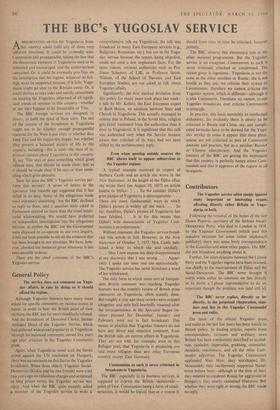General Policy
The service does not comment on Yugo- slav affairs, in case by doing so it should offend the regime.
'Although Yugoslav listeners have many times asked for specific comments on various events at home, in order to hear the British point of view on them, the BBC has for years steadfastly refused. And the broadcasts of Desmond Clarke, former Assistant Head of the Yugoslav Service, which had gathered widespread popularity in Yugoslavia through his balanced comments, ceased five years ago after criticism in the Yugoslav Communist press.
Again, when Yugoslavia voted with the Soviet group against the UN resolution on Hungary, there was no comment on this fact in the Yugoslav broadcasts. When three elderly Yugoslav Social- Democrats (Krekic and his two friends) were tried two years ago on ridiculous charges and sentenced to long prison terms, the Yugoslav service was silent. And when the BBC quite recently asked a member of the Yugoslav service to write a comprehensive talk on Yugoslavia, the talk was broadcast in many East European services (e.g., Bulgarian, Rumanian, etc.), but not in the Yugo- slav service because the report, being objective, could not omit a few unpleasant facts. For the same reason, eminent authorities such as Pro- fessor Schapiro, of LSE, or Professor Seton- Watson, of the School of Slavonic and East European Studies, are not asked to talk about Yugoslav affairs.
Significantly, the first marked deviation from this policy for many years took place last week : a talk by Mr. Kolarz, the East European expert at Bush House, on relations between State and Church in Yugoslavia. This actually managed to convey that in Poland, in the Soviet bloc, religion gets fairer treatment from the authorities than it does in Yugoslavia. It is significant that this talk was authorised only when the Service became aware that criticism of its ways had not been stilled by the parliamentary reply.
Even when quoting outside sources the BBC allows itself to appear subservient to the Yugoslav regime.
A typical example occurred in respect of Barbara Castle and an article she wrote in the New Statesman. At the height of the Djilas affair she wrote there (on August 10, 1957) an article hostile to Djilas: `. . . To the outsider Djilas's grim picture of Yugoslavia is unrecognisable. . . . There are more fundamental ways in which Djilas's picture is widely off the mark. . . So far, therefore, Djilas's picture of Yugoslavia has been falsified. . . . It is for this reason that Djilas's wild denunciation of Yugoslav Com- munism is so unfortunate.'
Without comment, the Yugoslav service broad- cast this article in full. However, in the New Statesman of October 5, 1957; Mrs. Castle pub- lished a 'letter in which she said candidly:
. • May I now express my deep disappointment at my discovery that I was wrong. . . . Appar- ently I spoke too soon and too optimistically.' The Yugoslav service has never broadcast a word of her withdrawal.
The only form in which some sort of indepen- dent British comment was reaching Yugoslav listeners was the monthly review of British press comments on Yugoslavia, often scantily done. But roughly a year ago these reviews were stopped altogether and only half-heartedly resumed after the correspondence in the Spectator began (re- views planned for December, January and February were not in fact broadcast). This means in practice that Yugoslav listeners do not have any direct and objective comment, from the British side, on current affairs in Yugoslavia. They are not told, for example, even in this Refugee year, that Yugoslavia is producing pro rata more refugees than any other European country except East Germany.
Communism as such is never criticised in broadcasts to Yugoslavia.
The BBC, especially in its Overseas services, is supposed to express the British—democratic- point of View. CoMmunistn being a form of totali- tarianism, 'it would be logical that as a system it
should from time to time be criticised, however politely.
The BBC observe this elementary rule in the other national programmes. But the Yugoslav service is an exception. Communism as such is never criticised, attacked or condemned. The reason given is ingenious: Yugoslavia is not the same as the other satellites or Russia; she is not hostile as they are; we criticise their system as. Communism; therefore we cannot criticise the Yugoslav system, which is different—although it is also Communist. Therefore we cannot, in our Yugoslav broadcasts, ever criticise Communism in principle.
In practice, this leads inevitably to intellectual dishonesty, for evidently there is plenty to be criticised in Russia and China, say, and compli- cated formulas have to be devised for the Yugo- slav service to make it appear that these phen- omena are not criticised as part of Communist doctrine and practice, but as a peculiar Russian or Chinese idiosyncrasy. And the Yugoslav listeners of the BBC are getting the impression that this country is perfectly happy about Com- munism and that it approves of the regime in all its aspects.










































 Previous page
Previous page